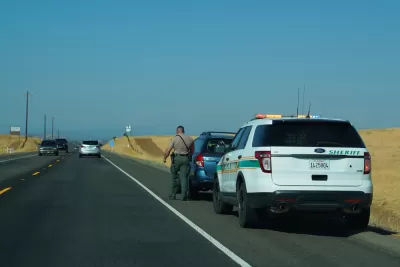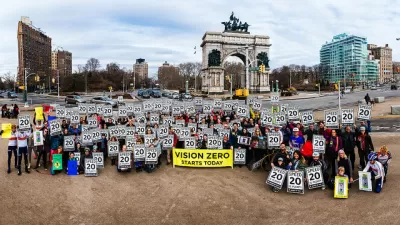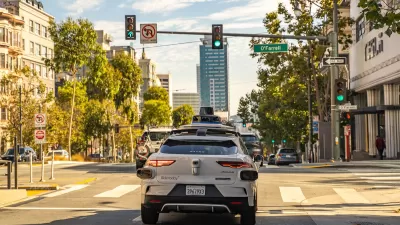While cars are still equated with freedom of mobility and personal liberty, they've also offered courts the chance to expand police powers in the public realm, time and time again.

Sarah A Seo, author of Policing the Open Road, writes for The Atlantic on the implications raised by police powers over motorists traveling the public realm in their vehicles.
Seo describes the fundamental conflict under study in this article thusly:
Officers’ power is fundamentally at odds with the notion of freedom on the open road. In American culture, driving is an expression of personal liberty. But under the law, driving is a privilege, not a right, and drivers are subject to extensive police surveillance.
It's a paradox, according to Seo, and one that the justice system continues to wrestle with, but largely doesn't interfere with the advancement of police power. The Supreme Court recently "punted" on a decision, according to Seao, in the case Mitchell v. Wisconsin, deferring to police discretion. It was hardly the first court to do so, according to Seo: "Even as Americans have built a society around cars, judges have abdicated their role of limiting law enforcement’s power over people’s daily lives."
Seo is not advocating that the state relinquish regulatory control over the safe and legal operation of motor vehicles when so many lives are at stake, but writes to raise the question of how many regulatory strings are too many.
FULL STORY: On the Road, Police Power Has Few Limits

Planetizen Federal Action Tracker
A weekly monitor of how Trump’s orders and actions are impacting planners and planning in America.

Map: Where Senate Republicans Want to Sell Your Public Lands
For public land advocates, the Senate Republicans’ proposal to sell millions of acres of public land in the West is “the biggest fight of their careers.”

Restaurant Patios Were a Pandemic Win — Why Were They so Hard to Keep?
Social distancing requirements and changes in travel patterns prompted cities to pilot new uses for street and sidewalk space. Then it got complicated.

Platform Pilsner: Vancouver Transit Agency Releases... a Beer?
TransLink will receive a portion of every sale of the four-pack.

Toronto Weighs Cheaper Transit, Parking Hikes for Major Events
Special event rates would take effect during large festivals, sports games and concerts to ‘discourage driving, manage congestion and free up space for transit.”

Berlin to Consider Car-Free Zone Larger Than Manhattan
The area bound by the 22-mile Ringbahn would still allow 12 uses of a private automobile per year per person, and several other exemptions.
Urban Design for Planners 1: Software Tools
This six-course series explores essential urban design concepts using open source software and equips planners with the tools they need to participate fully in the urban design process.
Planning for Universal Design
Learn the tools for implementing Universal Design in planning regulations.
Heyer Gruel & Associates PA
JM Goldson LLC
Custer County Colorado
City of Camden Redevelopment Agency
City of Astoria
Transportation Research & Education Center (TREC) at Portland State University
Camden Redevelopment Agency
City of Claremont
Municipality of Princeton (NJ)





























